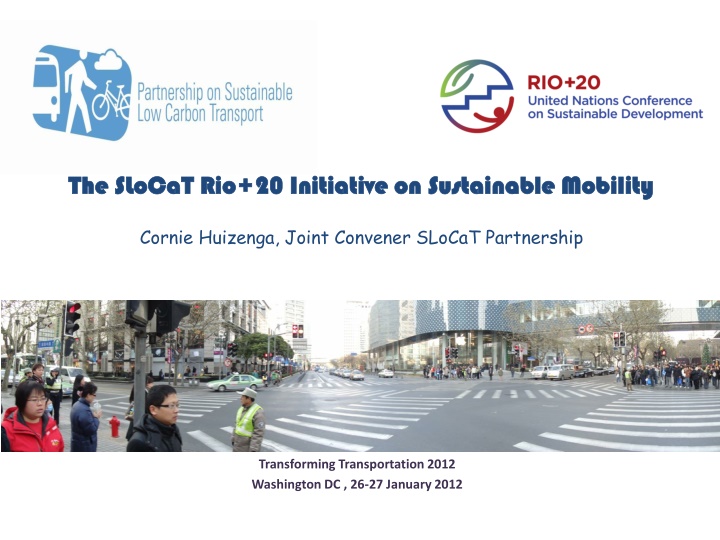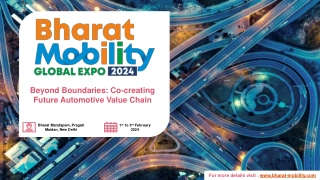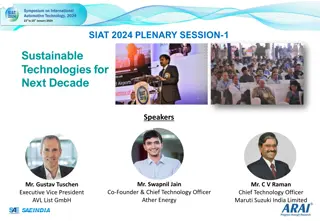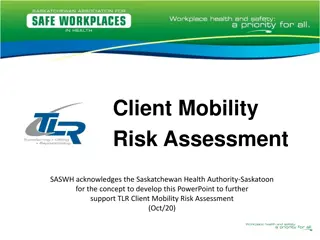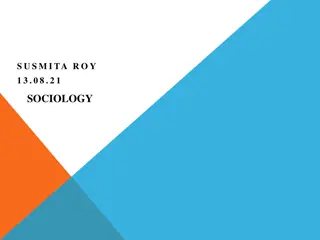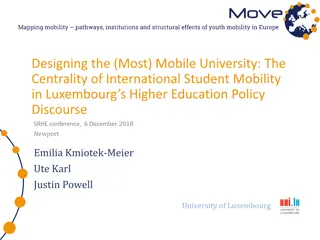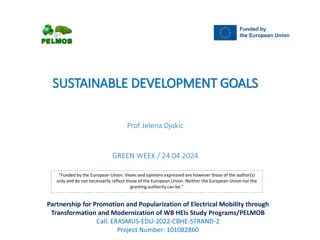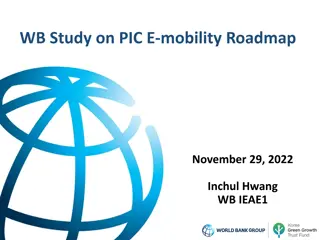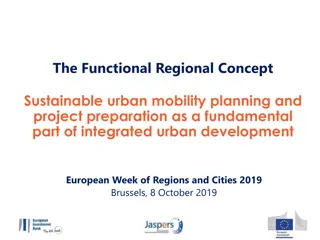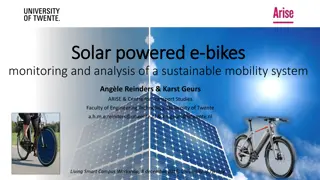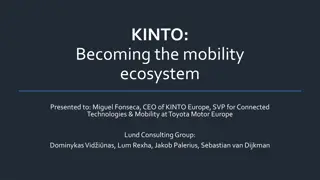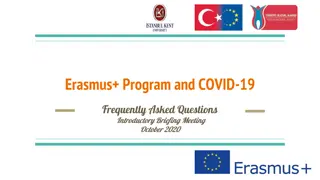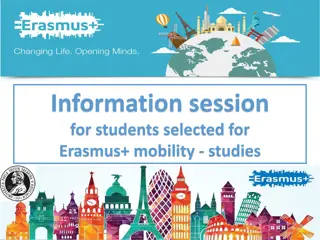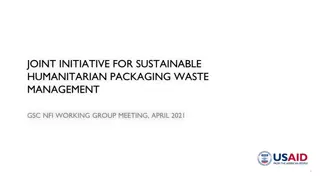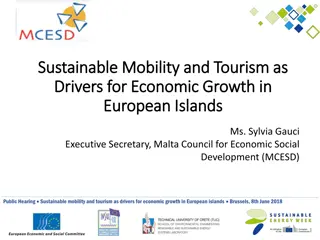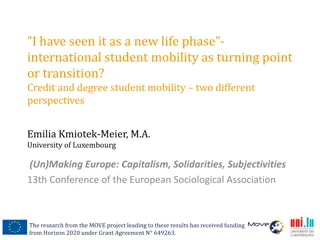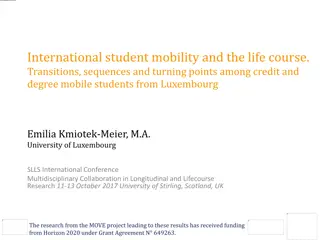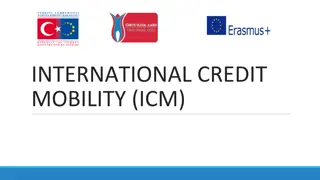SLoCaT Rio+20 Initiative on Sustainable Mobility
The SLoCaT Rio+20 Initiative on Sustainable Mobility aims to improve knowledge on sustainable, low-carbon transport, develop better policies, and catalyze their implementation. The initiative involves numerous partners across various sectors such as international organizations, government bodies, development banks, NGOs, and the private sector, all working towards a common goal of promoting sustainable transportation practices.
Download Presentation

Please find below an Image/Link to download the presentation.
The content on the website is provided AS IS for your information and personal use only. It may not be sold, licensed, or shared on other websites without obtaining consent from the author.If you encounter any issues during the download, it is possible that the publisher has removed the file from their server.
You are allowed to download the files provided on this website for personal or commercial use, subject to the condition that they are used lawfully. All files are the property of their respective owners.
The content on the website is provided AS IS for your information and personal use only. It may not be sold, licensed, or shared on other websites without obtaining consent from the author.
E N D
Presentation Transcript
The SLoCaT Rio+20 Initiative on Sustainable Mobility The SLoCaT Rio+20 Initiative on Sustainable Mobility Cornie Huizenga, Joint Convener SLoCaT Partnership Transforming Transportation 2012 Washington DC , 26-27 January2012
The SLoCaT Partnership Improve the knowledge on sustainable, low carbon transport, help develop better policies and catalyze their implementation 65 Members: International Organizations Government Development Banks NGOs Private Sector - Academe African Development Bank (AfDB) * Alliance to Save Energy* Asian Development Bank (ADB) * Corporaci nAndina de Fomento(CAF) *Believe Sustainability * Cambridge Systematics Inc * Center for Clean Air Policy (CCAP) * Centre for Environment Planning & Technology (CEPT), Ahmedabad * Center for Science and Environment (CSE) * Center for Sustainable Transport (CTS) Mexico * Center for Transportation and Logistics Studies (PUSTRAL), Gadjah Mada University * Civic Exchange (CE) * Clean Air Initiative for Asian Cities (CAI-Asia) Center * Clean Air Institute (CAI) * German Technical Cooperation (GIZ) * Ecofys* EMBARQ, The WRI Center for Sustainable Transport * Energy Research Center Netherlands (ECN) * European Bank for Reconstruction and Development (EBRD) * European Cyclists' Federation (ECF)* European Institute for Sustainable Transport (EURIST)* Fraunhofer- Institute for Systems and Innovation Research (ISI)* Global Environmental Facility (GEF) * Global Transport Knowledge Partnership (gTKP)* Global Urban Development* Green Mobility Brazil*HealthBridge* Hong Kong Shanghai Bank (HSBC) * Inter-American Development Bank (IDB) * Interface for Cycling Expertise (I-CE) * International Association for Public Transport (UITP * International Energy Agency (IEA) * International Transport Forum (ITF) * International Union for the Conservation of Nature (IUCN) * International Union of Railways (UIC) * Institute for Global Environmental Strategies (IGES) * The Institute for Transport Studies, University of Leeds, UK* Institute of Urban Transport India (IUTI)* Institute for Transport Policy Studies (ITPS) *Institute for Transport and Development Policy (ITDP) * Institute of Transport Studies (ITS), University of California, Davis * Korean Transport Institute (KOTI) * Ministry of Land Infrastructure Transport and Tourism, Japan *Mobility Magazine* National Center for Transportation Studies (NCTS), Philippines * Rockefeller Foundation * Society of Indian Automotive Manufacturers (SIAM) * Stockholm Environment Institute (SEI) * Tehran Urban and Suburban Railway operation Company (TUSROC) * The Energy and Resources Institute (TERI) * Transport and Environment (T+E) * Transport Research Laboratory (TRL) * United Nations Center for Regional Development (UNCRD) * United Nations Department for Economic and Social Affairs (UN-DESA) * United Nations Habitat (UN Habitat)* United Nations Environment Program (UNEP) * University College of London, Department of Civil, Environmental and Geomatic Engineering * University of Transport and Communication (UTCC) Hanoi * University of Twente/ITC (UT/ITC) * VEOLIA Transport * Victoria Transport Policy Institute (VTPI)* Volvo Research and Education Foundations (VREF)* World Streets * Wuppertal Institute* WWF International www.slocat.net
Millenium Development Goals http://www.undp.org/mdg/images/sanstexte_goal1.jpg Eradicate extreme poverty and hunger http://www.undp.org/mdg/images/sanstexte_goal2.jpg Achieve Universal primary education http://www.undp.org/mdg/images/sanstexte_goal3.jpg Promote gender equality and empower women http://www.undp.org/mdg/images/sanstext_goal4.jpg Reduce Child Mortality Transport http://www.undp.org/mdg/images/sanstexte_goal5.jpg Improve Maternal Health http://www.undp.org/mdg/images/sanstext_goal6.jpg Combat HIV/AIDS, Malaria and other dieseases http://www.undp.org/mdg/images/sanstexte_goal7.jpg Ensure Environmental Sustainability http://www.undp.org/mdg/images/sanstexte_goal8.jpg Develop a Global Partnership for Development
UNCED: United Nations Conference on Environment and Development Rio de Janeiro, 1992 Agenda 21 Transport referenced in Agenda 21 but did not spark-off wide spread action on Sustainable Transport WSSD: World Summit on Sustainable Development Johannesburg, 2002 Johannesburg Plan of Implementation Transport referenced again, increased focus on sustainable transport since 2005/2006 UNCSD: United Nations Conference on Sustainable Development Rio de Janeiro, 2012 Themes: Green Economy and Institutional Frameworks Transport not one of 7 major themes, but we need Rio+20 for scaling up sustainable transport SDG on Transport
Compilation document (647 submissions) Transport Details Rio+20 Submissions 2nd. Intersessional 15-16/12/2011 Half of countries mention transport Zero Draft outcome document January 2012 Sustainable Transport Road safety special attention 3 rd. Intersessional 26-27/3/2011 Linkage with MDGs and Green Economy not well articulated Informal negotiations Passenger transport not freight 3rd. Prepcom 13-15/6/2012 Green Economy requires funding and capacity building assistance Rio+20 20-22/06/2012
SLoCaT Submission to Rio+20 Adopt a Sustainable Development Goal specific to transportation: Achieve sustainable transport that enables universal access to safe, clean, and affordable mobility. 1 Ensure global transport GHG emissions and transport sector fossil fuel consumption peak by 2020 and are cut by at least 40 % by 2050 compared to 2005 levels, while ensuring transport contributes to timely attainment of healthful air quality in all cities; Support the Decade of Action for Road Safety (2011-20) and cut traffic-related deaths in half by 2025; Ensure universal access to sustainable transport though support for safe, affordable public transport and safe, attractive facilities for walking and bicycling; 2 Strengthen institutional arrangements to advance sustainable transport. 3 Endorse + encourage voluntary country actions for sustainable transport. Supported by: ADB, BtG, CTS-Mexico, CAF, CAI-Asia, ECN, ECF, EURIST, GIZ, GUD, IADB, ICE, IEA, ITDP, SEI, TRL, UITP, UT, Veolia-Transdev and ICCT
Zero Draft Outcome Document Published January 10: Transport mentioned 1 times Energy mentioned 15 times Sustainable Mobility as Priority Area under Green Economy Comments due from countries January 25 Section I+II February 17 Section III-V Sustainable mobility as possible SDG Include sustainable mobility in Voluntary Commitments SLoCaT: Letter to UNCSD Focal Points Briefing UN Missions New York Bilateral Meetings Outreach meetings Side event 3rd Intersessional
SLoCaT Rio+20 Proposed Initiative on Sustainable Transport in Developing Countries Sustainable Development Goal on Sustainable Transport UN-Transport -Policy- MDB Rio+20 initiative on Sustainable Transport -Funding-
UN- Agencies Regional Commissions UN-DESA UN Transport UN Transport Light SLoCaT Strengthen coordination and coherence among UN agencies, including Regional Commissions on sustainable transport Or NGOs and Civil Society UN Transport Medium UN Secretary General High Level Council on Transport Provide information, build knowledge Private Sector Or Set global agenda on sustainable transport UN Transport Heavy Conduct regional policy dialogs EST Resource mobilization Development Banks and bilateral Development organizations
Name Total Annual (2010) lending Annual (2010) Transport lending Multilateral Development Banks African Development Bank UA 4.1 billion (~$ 6.15 billion) UA 1.2 billion (~$ 1.8 billion) transport 1.5 billion transport, Transport lending: About $ 30 billion per year Asian Development Bank European Bank for Reconstruction and Development $ 13.8 billion 9 billion total lending Total Lending: About $ 130-$ 150 billion per year ~$ 4.5-5 billion European Investment Bank Inter-American Development Bank 5.5 billion $ 12.1 billion total lending 0.8 billion $ 1.6 billion transport Islamic Development Bank $ 3.7 billion total lending $ 1.0 billion transport Latin American Development Bank (CAF) $10.5 billion total lending $ 4.3 billion transport Suggested Rio+20 Pledge: 1. Mainstream Sustainability in continued Road ~$ 0.4 billion (estimate only) lending Development Bank for Southern Africa Rand 17 billion (total lending) (~$ 2 billion) 2. Re-orient lending portfolio towards sustainable transport 3. Leverage MDB transport funding (Sustainable Wealth Funds, Pension Funds) World Bank Bilateral Development Banks Agence France de Developpement $ 43 billion ~$ 8.6billion (2011) 6.8 billion ~ 1 billion transport Japan International Cooperation Agency $10.8 billion ~$4.2 billion MDB Group on Sustainable Transport Kreditanstallt fuer Wieder Aufbau 4.4 billion 0.8 billion (estimate only)
Proposed SLoCaT 2012 Activities in Support of Rio+20 Working Group to define Sustainable Transport/Mobility, set indicators and Targets (first half 2012) Develop overall structure for Regional EST Forums in Asia, Africa, and Latin America (national +Cities), and develop proposals for active follow-up on Declarations (all of 2012) Transport data continue work on Global Transport Intelligence incorporating new IDB, ADB and WB data projects (all of 2012) Urban Transport Finance in support of EST Cities meetings in Asia and Latin America
SLoCaT at: Visibility of Sustainable Mobility at Rio+20 Promote sustainable transport BEFORE Rio (website, newsletters, meetings) Package all transport activities in Rio+20 and market these Integrate Transport in activities of other major groups: women, youth, private sector Sustainable Mobility as 8th Round Table? Social Media
